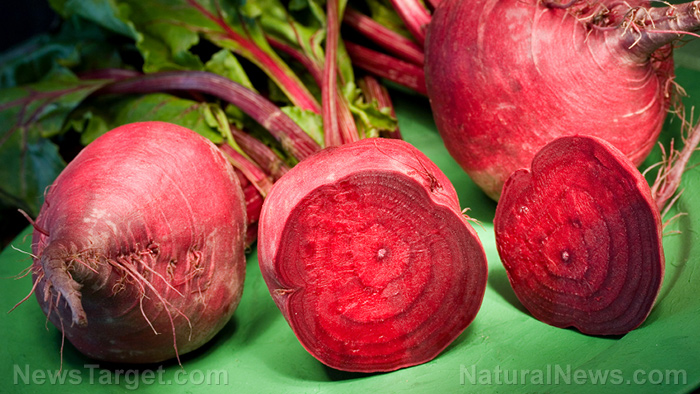Beets: A colorful root vegetable brimming with health benefits
08/10/2025 / By Laura Harris

- Beets have been cultivated for over 4,000 years, originally valued for their leaves and later prized for their medicinal and nutritional properties by the ancient Greeks and Romans.
- Rich in essential nutrients and low in fat and calories, beets offer vitamins A, C, B-complex, iron, magnesium, potassium and folate.
- Beets support heart health, improve blood flow, aid digestion, boost exercise performance, reduce inflammation and help prevent anemia and oxidative stress.
- Beets can be enjoyed raw, cooked, fermented or juiced. They also pair well with a variety of ingredients and can be used in sweet and savory dishes.
- While highly beneficial, people with kidney issues and blood sugar concerns should limit their beets intake. Choosing organic beets is advised to avoid pesticides and heavy metal contamination.
Beets (Beta vulgaris) are a vibrant, nutrient-dense root vegetable with a rich history dating back thousands of years. Wild beets were first cultivated in the Mediterranean region around 2,000 BCE and were originally grown for their leaves, not their roots. The ancient Greeks and Romans prized wild beets for their medicinal properties, while later civilizations, such as the Babylonians, used them as food and medicine.
The modern beetroot first emerged in 16th-century Europe, with selective breeding enhancing its sweetness and size. By the 19th century, sugar beets had become a major source of sucrose, revolutionizing sweetener production. Today, beets are celebrated not only for their culinary versatility but also for their impressive nutritional and therapeutic benefits.
Nutritional profile and health benefits
Beets are a nutritional powerhouse, packed with essential vitamins, minerals and bioactive compounds. A 100-gram (g) serving of raw beets provides:
- 9.6 g of carbohydrates, including dietary fiber
- 1.6 g of protein
- 0.2 g of fat
- Eight percent of the daily value (DV) for vitamin C
- 20 percent of the DV for folate (B9)
- Four percent of the DV for iron
- Six percent of the DV for magnesium
- Nine percent of the DV for potassium
Packed with vitamins A, C and B-complex, and minerals like iron, calcium and phosphorus, beets can promote skin vitality, bone strength and efficient energy production. Additionally, their antioxidant and anti-inflammatory properties help combat oxidative stress, enhance exercise performance and protect against chronic diseases, making beets a valuable addition to a healthy diet.
Here are some remarkable benefits associated with eating beets:
Supports immune function and skin health
- Beets contain 10 milligrams (mg) of vitamin C, providing half of the daily recommended intake. Vitamin C strengthens the immune system and promotes collagen production for healthy, glowing skin. Meanwhile, the vitamin A (20 IU) in beets helps maintain healthy vision and immune defenses.
Enhances energy metabolism
- Thiamine (B1) plays a key role in nerve function and energy metabolism, while riboflavin (B2) and niacin (B3) assist in converting food into usable energy. These B vitamins also contribute to cardiovascular health, ensuring efficient energy production throughout the body.
Promotes heart health
- The natural nitrates in beets can improve blood flow and lower blood pressure, while potassium helps regulate heartbeat and balances sodium levels, reducing the risk of hypertension and supporting overall heart function.
Helps prevent anemia
- The iron in beets support red blood cell production, preventing fatigue and anemia. Folate (B9) is essential for DNA synthesis and healthy blood cell formation, ensuring proper oxygen transport and overall vitality.
Strengthens bones and teeth
- Calcium and phosphorus work synergistically to maintain strong bones and teeth while supporting muscle function and nerve signaling. These minerals are crucial for skeletal health and the body’s overall structural integrity.
Supports digestive health
- The fiber in beets promotes healthy digestion and prevents constipation. Naturally low in fat, beets are gentle on the digestive system and heart-friendly, making them an excellent food for supporting gut health.
Supports weight management
- Low in calories yet nutrient-dense, beets are an ideal addition to weight-loss diets. Their natural sweetness helps curb sugar cravings without providing excess fat or empty calories.
Fights oxidative stress and reduces inflammation
- The deep red betacyanin pigments in beets can protect cells from oxidative stress by neutralizing free radicals, reducing inflammation in the process. Vitamin C also functions similarly, helping to enhance the body’s natural defenses. (Related: The vibrant journey of Beets: From ancient greens to modern superfood.)
Boosts exercise performance
- Dietary nitrates improve oxygen efficiency, increasing endurance and stamina during physical activity. The carbohydrates in beets also provide a quick energy boost, aiding in workout performance and post-exercise recovery.
Beets are overwhelmingly considered beneficial for health, with very few drawbacks. Their high antioxidant content supports liver detoxification, brain health and cardiovascular function. However, individuals prone to kidney stones (due to oxalates) and those watching their sugar intake are advised to consume beets in moderation.
While beets are generally safe, non-organic varieties may contain pesticide residues such as glyphosate, a herbicide linked to health concerns. Additionally, root vegetables like beets can absorb heavy metals (cadmium, lead) from contaminated soil.
Choosing organic beets minimizes these risks, ensuring a cleaner, toxin-free product. Organic farming practices also enhance soil health, preserving the vegetable’s nutritional integrity.
Culinary uses of beets
Beets are incredibly versatile, lending themselves to both sweet and savory dishes. Their earthy sweetness pairs well with citrus, nuts, cheeses and hearty grains. Below are some popular ways to incorporate beets into meals:
Raw beets
- Beet salads (shaved or grated with carrots, apples and walnuts)
- Beet hummus (blended with chickpeas, tahini and garlic)
Cooked beets
- Roasted beets (tossed with olive oil, salt and herbs)
- Beet soup (Borscht) – A traditional Eastern European dish
Fermented beets
- Beet kvass – A probiotic-rich tonic
Juices and smoothies
- Beetroot juice (often mixed with ginger, lemon or apple)
From ancient medicine to modern superfood, beets have proven to be a nutritional and therapeutic gem. Whether consumed raw, cooked or juiced, their antioxidant, heart-healthy and detoxifying properties make beets a must-add to any wellness-focused diet.
This story is not medical advice and is not intended to treat or cure any disease. Always consult with a qualified naturopathic physician for personalized advice about your specific health situation or concern.
Visit NaturalNews.com, a great article source where you can learn about superfoods and their health benefits.
You can also try Brighteon.ai, an AI model created by Mike Adams, also known as the Health Ranger. This model is available as a free download to be run locally and is designed to help share and decentralize knowledge. By doing so, it aims to bypass censorship and empower people with knowledge.
If you’re looking for an uncensored video free speech website where you can openly discuss nutrition, natural medicine, ingredients and more, check out Brighteon.com and these two free speech social media sites, Brighteon.IO and Brighteon.social.
Watch this video to learn more about the impressive health benefits of beets.
This video is from the Health Zone channel on Brighteon.com.
More related stories:
6 Good reasons to eat more beets.
Study: Betalains in beets can help reduce fatigue and boost athletic performance.
Beet juice: A superfood for boosting heart health and physical performance.
Sources include:
Submit a correction >>
Tagged Under:
#nutrition, beets, food cures, food is medicine, food science, functional food, grocery cures, health science, ingredients, natural health, nutrients, organics, phytonutrients, veggie
This article may contain statements that reflect the opinion of the author





















